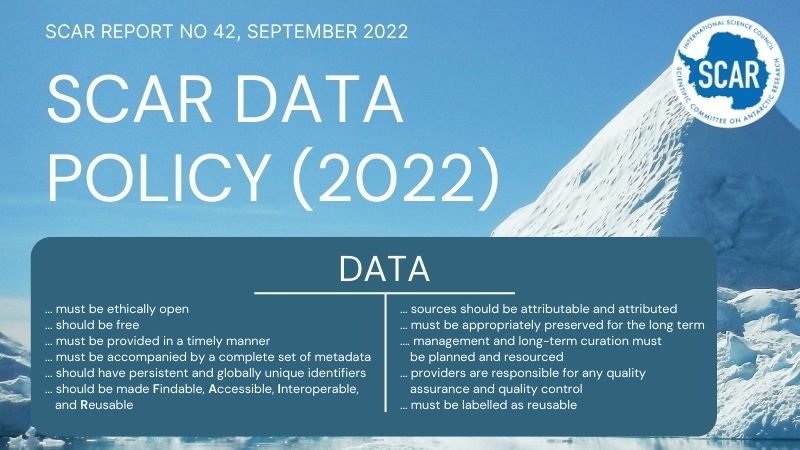We are pleased to announce that the latest SCAR Report (number 42) is now published on the website.
It contains the SCAR Data Policy (2022) and is available to view and download from the SCAR Library.
Background:
The International Science Council (ISC, formerly ICSU and ISSC) is the parent body of SCAR. In its Assessment on Scientific Data and Information in 2004, the ISC observed that “science has long been best served by a system of minimal constraints on the availability of data and information”, and that a strong public domain for scientific data and information promotes greater return from investment in research, stimulates innovation and enables more informed decision-making. Thus, one of the fundamental recommendations of the assessment is that “ICSU should continue to actively promote the principle of full and open access to scientific data”.
Additionally, countries working in the Antarctic operate within the framework of the Antarctic Treaty System. The cornerstone of the system is the Antarctic Treaty, which was signed on December 1, 1959, and came into effect on June 23, 1961. Of particular relevance for polar data management and delivery is Article III, section 1(c), which stipulates that “scientific observations and results from Antarctica shall be exchanged and made freely available”. This Article has been followed up by ATCM Resolutions, such as:
- ATCM Recommendation XIII-5 (1985), which invites SCAR to offer advice “on steps that possibly could be taken to improve the comparability and accessibility of scientific data on Antarctica.”
- ATCM XXII Resolution 4 (1998), which recommends that Consultative Parties establish National Antarctic Data Centres and link these to the Antarctic Data Directory, and that they give priority consideration as to how the requirement for freedom of access to scientific information is achieved within their national data management systems.
Effective data management is a critical part of operating responsibly within the Antarctic environment, and it is essential that SCAR is able to provide clear guidance to researchers and research programmes on data management requirements.
In 2019, the Standing Committee on Antarctic Data Management (SCADM) initiated a process to align the data policies of international scientific bodies coordinating research in the polar regions. Following this, a working group under SCADM, SOOS, IASC, SAON, and the Arctic SDI published the report “Alignment of Polar Data Policies – Recommended Principles” in November 2021 (DOI: 10.5281/zenodo.5734900). The report examines external policy drivers and overarching global and regional data policies, notably those of the Antarctic Treaty, ISC, UNESCO, WMO, IOC, UN-GGIM, OECD, and GEO, and concludes by recommending and explaining ten fundamental principles for polar data policies. This data policy is based on those ten principles.

